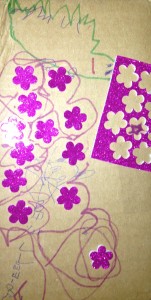
Not cover to cover, as you would a novel. Rather I pick them up, flip through the pages, pause to dip into them in search of new words to file away mentally. I relish new words so I’m always looking for them, especially sinewy and interesting new verbs, or nouns crusted with bits of morphological history.
I know I’m not alone in this — it’s a disease that many (though certainly not all, or even most, I think) writers (and some non-writers) share, and it’s not one its sufferers talk about much, because Good LORD how boring is that, reading the dictionary?
I have an American Heritage I’ll never part with, and beyond that the beloved Compact OED, three volumes and accompanying magnifying glass, that my brother Lowell got for me while I was in grad school and which will be with me till my dying days, I firmly well. And specialized dictionaries: a Penguin Dictionary of Symbols, a dictionary of foreign terms, another of fashion terms, and a glut of foreign language dictionaries, Russian, Hawaiian, Navaho, jostle for space on one on my most visited bookshelves.
Morphology — the history built into the syllables — fascinates me. That the proto Indo-European word “dwoh” (two) leads to words like double and duo and duplicate and duplicity (two-facedness) is just too cool. In my junior year of high school we had a vocabulary textbook that focused on roots – each section was several roots along with lengthy lists of words derived from them. I loved the idea that you could take a word apart and find its meaning built into it with the syllables of which it was made.
When I was in grad school, we had evenings of pot-luck suppers followed by play reading or rounds of the dictionary game (for which the aforementioned American Heritage was often employed). I will argue that playing word-games can be fun, but that playing it with clever writers can be intoxicating and exhilarating (note the shared root with “hilarity” there) and make you laugh so hard and long your face hurts. My all-time favorite remains the false definition for the word “nidor” – Naval acronym employed when inspecting submarines, stands for Nothing Is Damp Or Rusted.
Sometimes self-consciousness overtakes me. In high school a girl once asked me why I talked “so snobby,” an accusation that still pokes me on occasion. It’s a reason I like talking to other writers — no one views a previously unknown word as a hostile act but rather a gem that duplicates itself in the sharing. No one’s the poorer for talking to someone whose vocabulary stretches them.
Nothing jars on me quite so much as a word used in a half-right fashion, a square peg hammered down into that round hole and MADE to fit through sheer Humpty-Dumptyian insistence (an Alice in Wonderland reference that all we word-lovers know, go read the book if you never have, particularly if you’re a fantasy writer).
What about you? What are the words or word sources that you particularly love?







3 Responses
The notion of using a word in a “half-right fashion” is circular; the way that lexicographers know what the “right” definition of word is is by deducing its meaning from how people use it. Words aren’t manufactured in a dictionary and then released into the world of speakers and writers, where some people just don’t get them right. It’s the other way around.
Of course, people can argue that a word “should” mean this-and-that, based on its etymology, its historical use (evidence that’s often not nearly as concrete as is sometimes imagined, especially for “hard” or commonly “misused” words), or of course based on what a lexicographer has written. But the lexicon of the demotic has never been successfully corralled into boundaries established by dictionaries. People use words they way they will, and lexicographers in general consider their job not to be leading the crowd, but trying to keep up with it.
All that said, this doesn’t mean that it isn’t possible for people to use a word incorrectly. Individuals of course might simply have the wrong definition in their heads. A friend of mine has a favorite example where he says for a long time he thought the word “erstwhile” meant “distinguished.” And I’m sure I’ve corrected my misunderstanding of dozens (hundreds) words like that plus continue to have a healthy collection of words whose meanings I don’t have quite right. In those cases, tho, the writer is not insisting on a new meaning, I don’t think, and would not be obstinate about their intent. Then again … 🙂
I love dictionaries and encyclopedias, too. I collect words like a child collects pretty rocks. Ha–I collect those, too.
I remember being asked to ‘shut up’ by my ninth grade teacher when I corrected her use of a gerund. After that, I didn’t speak in a single class unless called upon until college. Where I was told to shut up by a very bad English prof, again. In grad school, I diagrammed a poorly written
sentence in the midst of a debate about what the first-year guidebook said was expected of us grad students on our second-year competency exams. The prof, a very proper British archaeologist, threatened violence when I showed the sentence was poorly constructed, because the modifier was on the verb. Turns out she’d written it.
Nowhere have I found as much love for words as in the midst of fellow writers. Even my linguist friends are less excited by them, I think.
I’m addicted to etymological dictionaries. I usually use them online, though
Oxford has recently come out with a new, historical thesaurus that I absolutely need to get at some point. http://www.oup.com/us/catalog/general/subject/Reference/?ci=9780199208999&view=usa
That looks pretty darn amazing and will take up a lot of my time.